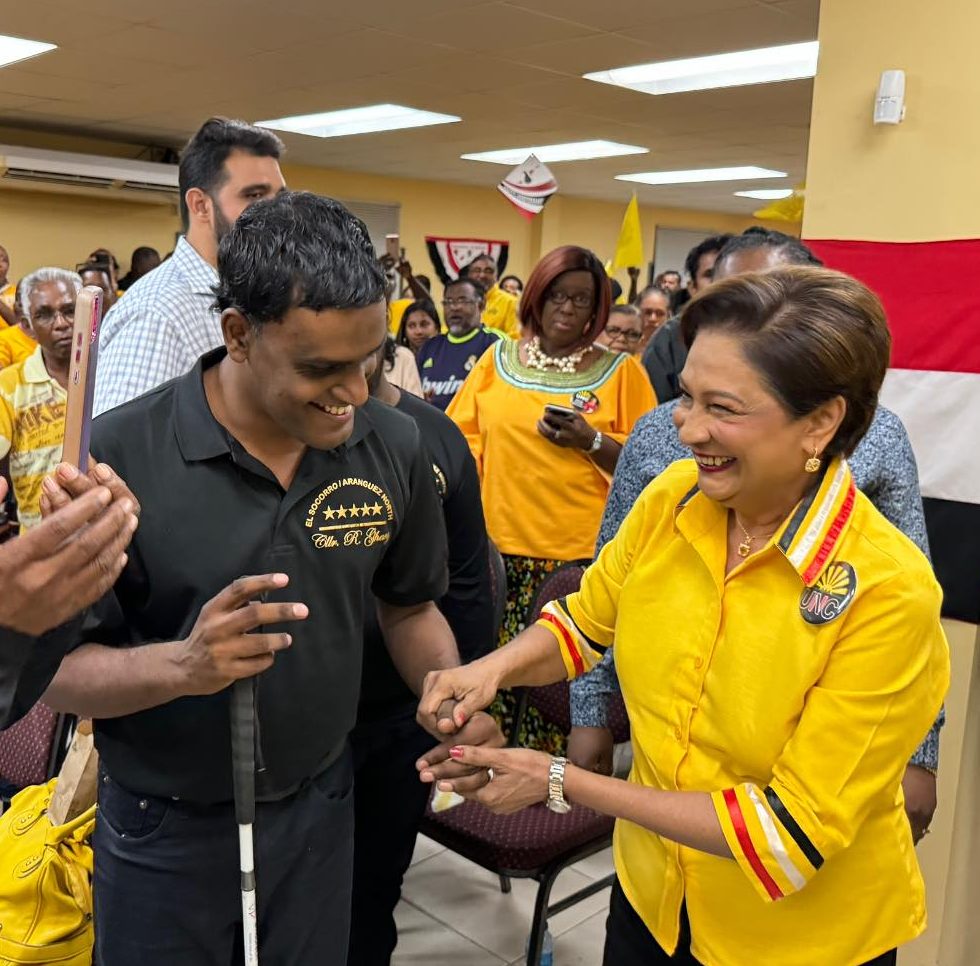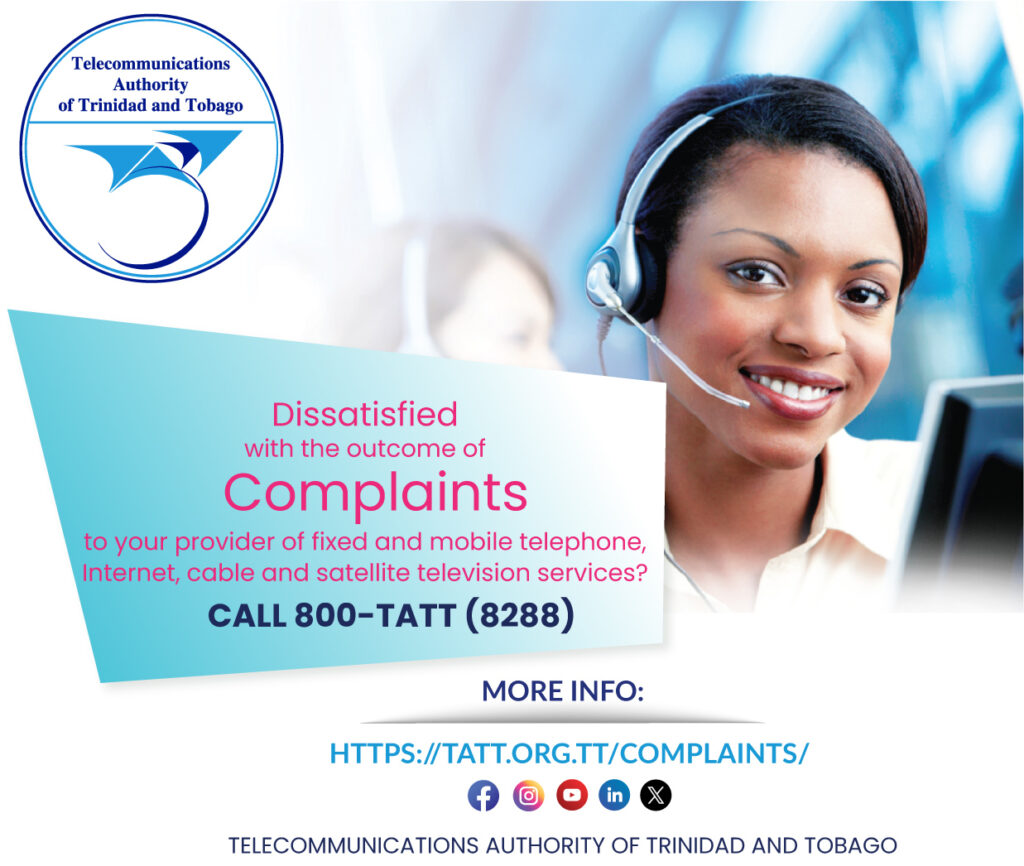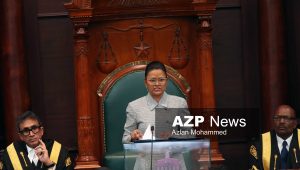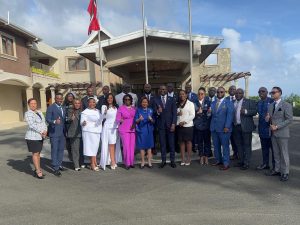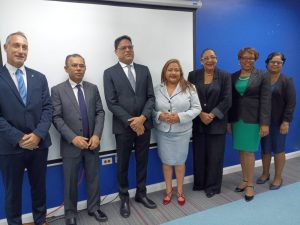Caption: United National Congress (UNC) Political Leader at and the Monday Night Report at the party’s headquarters in Chaguanas. Photo: Facebook/UNC
OPPOSITION Leader Kamla Persad-Bissessar wants to raise the legal age for marijuana use and gambling to 25 years.
She made the announcement at the Monday Night Report held at the party’s Chaguanas headquarters. The political leader of the United National Congress said this was part of the plans in a draft manifesto of the party for the next general elections.
Among the proposals is the raising of the legal age for marijuana use and gambling to 25 years and older, a move aimed at addressing public health and safety concerns, she said. The manifesto also has plans to support for crime victims through job opportunities and housing, alongside the introduction of a constitutional right ensuring a trial within a reasonable timeframe.
Persad-Bissessar also highlighted the party’s intention to incentivise crime reduction through monetary rewards for police officers and divisions that maintain low crime rates. In a bid to alleviate economic burdens, the UNC vows to block any property tax and prevent hikes in water and electricity rates amidst the current economic difficulties.
The UNC leader criticised the current People’s National Movement (PNM) administration’s handling of national security, citing a staggering murder rate that has surpassed 400 this year. She attributed the crime wave to the failure of successive ministers and police commissioners under the ruling People’s National Movement (PNM).
Moreover, Persad-Bissessar condemned the alleged preferential treatment during Covid-19 lockdowns, accusing the government of using the pandemic to suppress dissent while allowing certain elites to flout restrictions.
The manifesto’s first copy is set to be unveiled online, signalling the party’s readiness for what Persad-Bissessar termed “the mother of all elections.”
She told supporters to brace for a challenging electoral battle.
Persad-Bissessar outline the UNC’s manifesto plans:
1. Undertake a comprehensive review of all criminal laws to weed out obsolete laws that are oppressive to a free democratic society or cause unnecessary bureaucracy.
2. Categorise the offenses of murder and rape into first-degree and second-degree murder.
3. Introduction of a constitutional right of an accused to have a trial within a reasonable time.
4. Place victims at the centre of the criminal justice system from the beginning: providing support for victims, including restitution, job placements, housing, and social programs. Due to the current low detection and conviction rate, support will be given regardless of if someone is caught or convicted.
5. Provide the needed resources to ensure that cases involving offences against children and sexual offences are determined rapidly.
6. Raise the legal age for marijuana use and gambling to 25 years and older.
7. Increase the number of functional courtrooms. Right now, there is a deficit. Each Judge of the High Court must have a designated courtroom to ensure they can sit every day.
8. Provide more courtrooms in highly populated areas outside the capital, such as Chaguanas, Rio Claro, Sangre Grande, and Diego Martin.
9. Increase critical support for the judiciary to ensure backlog reduction and trial indictable cases within two to three years.
10. Create smaller detention centres around the country to break up gang activity and to ensure closer family support to prisoners by enabling regular visitation.
11. We will also ensure that incarcerated persons are allowed frequent visitation from their children.
12. Establish lower security prisons for first- time non-violent offenders with work release during the day.
13. Modernise prisons and break up large prisons into smaller ones, where inmates can be better monitored.
14. Utilise intelligence services for crime fighting and not for spying on political opponents.
15. Implement appropriate social programmes involving training and life skills to prevent recidivism.
16. Comprehensively reform and reorient the education system to cater to all children, not just academically gifted ones, and, in particular, to identify young persons with learning disabilities or vulnerabilities so they can be guided to productive activities. Most criminals have not been successful in the education system.
17. Encourage the participation of NGOs and service organisations in mentoring youth. Targeting and mentoring at-risk youth is vital to preventing young persons from falling under the influence of gang leaders and falling through the cracks.
18. Support single parents, including after- school care, to ensure children are supervised. Homework centers shall be reintroduced nationwide.
19. Introduce a system of monetary rewards for police officers and divisions where crime is kept low and crime-fighting targets are met.
20. Invest resources in the DPP’s and Public Defender’s offices and ensure better conditions and salaries so staff are encouraged to stay.
![]()


